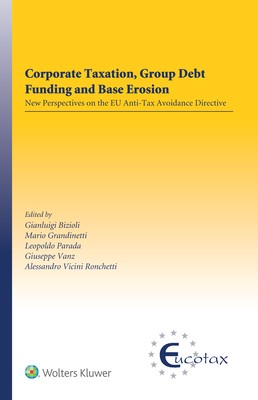
- Išsiųsime per 10–14 d.d.
- Leidėjas: Kluwer Law International
- Metai: 2020
- Puslapiai: 280
- ISBN-10: 9403511702
- ISBN-13: 9789403511702
- Formatas: 15.6 x 23.4 x 1.8 cm, kieti viršeliai
- Kalba: Anglų
- Extra -15 % nuolaida šiai knygai su kodu: ENG15
Corporate Taxation, Group Debt Funding and Base Erosion + nemokamas atvežimas! | knygos.lt
Atsiliepimai
Aprašymas
The EU's Anti-Tax Avoidance Directive (ATAD), implemented in January 2019, confronts Member States with complex challenges, particularly via the introduction of an interest limitation rule. This timely book, the first in-depth analysis of the features and implications of the directive, provides insightful and practical discussions by experts from around Europe on the crucial interactions of the ATAD with other existing anti-tax avoidance measures, the European financial sector and the fundamental freedoms.
Specific issues and topics covered include the following:
- relation with the OECD's Base Erosion and Profit Sharing project (BEPS) and the EU's Common Corporate Tax Base initiative;
- technical subjects relating to corporate taxation and debt funding;
- problems caused by the diametrically opposite tax treatment of debt and equity within a group of companies;
- exclusion clauses for interest expenses; and
- interplay between interest limitation rules and anti-hybrid rules.
A comparative analysis of implementation issues in four leading Member States--Germany, Italy, Spain and The Netherlands--as well as a global general survey with regard to interest limitation rules allow readers to assess the particular complexities associated to the implementation of the ATAD.
This matchless commentary by leading European tax law academics and practitioners on an important and much-debated item of EU legislation gives practitioners, enterprises and tax authorities an early opportunity to understand the practical effects of the directive in the various Member States.
EXTRA 15 % nuolaida su kodu: ENG15
Akcija baigiasi už 02:19:47
Nuolaidos kodas galioja perkant nuo 10 €. Nuolaidos nesumuojamos.

- Leidėjas: Kluwer Law International
- Metai: 2020
- Puslapiai: 280
- ISBN-10: 9403511702
- ISBN-13: 9789403511702
- Formatas: 15.6 x 23.4 x 1.8 cm, kieti viršeliai
- Kalba: Anglų
The EU's Anti-Tax Avoidance Directive (ATAD), implemented in January 2019, confronts Member States with complex challenges, particularly via the introduction of an interest limitation rule. This timely book, the first in-depth analysis of the features and implications of the directive, provides insightful and practical discussions by experts from around Europe on the crucial interactions of the ATAD with other existing anti-tax avoidance measures, the European financial sector and the fundamental freedoms.
Specific issues and topics covered include the following:
- relation with the OECD's Base Erosion and Profit Sharing project (BEPS) and the EU's Common Corporate Tax Base initiative;
- technical subjects relating to corporate taxation and debt funding;
- problems caused by the diametrically opposite tax treatment of debt and equity within a group of companies;
- exclusion clauses for interest expenses; and
- interplay between interest limitation rules and anti-hybrid rules.
A comparative analysis of implementation issues in four leading Member States--Germany, Italy, Spain and The Netherlands--as well as a global general survey with regard to interest limitation rules allow readers to assess the particular complexities associated to the implementation of the ATAD.
This matchless commentary by leading European tax law academics and practitioners on an important and much-debated item of EU legislation gives practitioners, enterprises and tax authorities an early opportunity to understand the practical effects of the directive in the various Member States.




Atsiliepimai